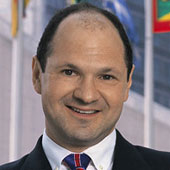Urbi et Gorbi
Why does former Soviet leader Mikhail Gorbachev not get credit for ending the Cold War?
November 11, 2009
Americans think they know who won the Cold War. It was Ronald Reagan, of course, with his tough talk and massive increases in defense spending.
If you doubt that it was really Mr. Reagan who defeated the Evil Empire, then surely it must have been his successor, George Bush, Sr. to whom credit is due, right?
It was under that President Bush that the Berlin Wall fell, Germany became reunited — and the Soviet Union disintegrated into 15 sovereign states.
However, in reality, the political credit for managing the ultimate defeat of communism and ending Soviet domination over Eastern and Central Europe must go to a very different man. This man was also the first Soviet President — and the last ruling Secretary General of the Communist Party of the Soviet Union.
That, by the way, is quite unusual for a Soviet leader. Stalin had thousands of towns, villages and hamlets named after him, as well as streets, lakes and even mountain peaks. Lenin still does, including the Moscow subway system and the Russian equivalent of the U.S. Library of Congress.
Even Leonid I. Brezhnev had a town named after him for a time, and so did Yuri V. Andropov, a brutal KGB chief who briefly ruled the USSR in the early 1980s. But Mr. Gorbachev is not so lucky.
Yet, without him, the world would have been a very different place. When Mr. Gorbachev first joined the Soviet Union’s ruling Politburo in the late 1970s, he was its youngest member.
In fact, quite amazingly, the only one at the time under 70 years of age. By dint of hard work, intellectual ability, ambition and determination, he rose to the top of the party ladder by 1985.
Historians have already started a debate on whether the Soviet Union was doomed anyway — or whether it actually required a bold reformer such as Mr. Gorbachev to bring about its peaceful collapse.
While Mr. Gorbachev was certainly a convinced communist, he was determined to go further than anybody in promoting open debate within Russia — and allowing self-determination to its so-called satellite countries.
He was also much more courageous than the second-tier reformers whom he had brought into the Politburo. His courage to stay the course of power-shedding unsettled them. When the hardliners staged a coup against Mr. Gorbachev in August 1991, most of his colleagues in the Politburo sided with them.
After his fall from power, many people in Russia blamed Mr. Gorbachev for what they called the destruction of a Great Superpower. Surviving communists and ultra-nationalists even accused him of being a paid agent in the service of America’s Central Intelligence Agency as well as international Zionism.
Mr. Gorbachev had to suffer a series of humiliations. Boris N. Yeltsin, his political opponent from the perestroika days, took away the building which housed the Gorbachev think tank, leaving him only a small office.
The rest of the building was given to a Finance Academy. Ironically, its task was to train Russia’s future free-market elites, which of course couldn’t have come into being without Mr. Gorbachev’s reforms.
When Mr. Gorbachev tried to stage a political comeback in the 1996 presidential elections, he garnered a measly 0.5% of the popular vote according to the official count.
In the West, Mr. Gorbachev was more popular. He was accorded a hero’s welcome in most Western capitals while he was still a Soviet leader. He even won the Nobel Peace Prize in 1990, becoming the first-and last-Soviet official to do so.
On the global front, Mr. Gorbachev has been quite visible — via his ads for luxury luggage maker Louis Vuitton and his Gorbachev Foundation.
As far as Russians are concerned, they somewhat perversely tend to adore their tyrants and murderers — such as Ivan the Terrible and Stalin — while they are still alive. As for decent national figures, such as Mr. Gorbachev, they usually start to appreciate them only after they are gone — if at all.
Many Russians still blame Mr. Gorbachev for all the woes that have befallen them since the collapse of communism. The really strange thing, until recently, was that there wasn’t a corresponding proportion of people in the West who are grateful to him for a safer, freer world in which they now live.
Angela Merkel paid her dues when, during the 20th anniversary celebration commemorating the fall of the Berlin Wall when she turned to Mr. Gorbachev and said, "We knew something had to happen [in the USSR] before anything could happen here. You let things run their course, and it was a lot more than we could have hoped for at the time."
In the United States, the trend remains to accord all the glory to former President Reagan — and virtually none to Mikhail Gorbachev.
The pope in Rome surely isn’t the only one who would begin to differ with this quite U.S.-centric perspective. He knows that more peace on earth wasn’t all just an American’s doing.
Editor's Note: This feature is adapted from an essay originally published in The Globalist's Executive Edition on July 25, 2001.
Takeaways
After his fall from power, many people in Russia blamed Mr. Gorbachev for what they called the destruction of a Great Superpower.
In the United States, the trend remains to accord all the glory to former President Reagan — and virtually none to Mikhail Gorbachev.
Gorbachev was accorded a hero's welcome in most Western capitals while he was still a Soviet leader.
Read previous
The Legacy of Walls
November 10, 2009
